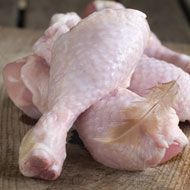
FSA releases its first quarterly set of findings from a new survey
Fifty-nine per cent of fresh shop-bought chickens have tested positive for campylobacter, a new survey by the Food Standards Agency (FSA) has revealed.
Of these, 16 per cent were found to be heavily contaminated. The bacteria was also identified on the outside of the packaging in 4 per cent of the 853 samples tested.
Published yesterday (August 5), the results are the first set of quarterly findings from a survey undertaken by the FSA to aid the fight against campylobacter, which is the most common cause of food poisoning in the UK. It is estimated to affect around 280,000 people every year and the majority of these cases are due to contaminated poultry.
The survey launched in February this year and will run for 12 months in total, testing 4,000 samples of whole chickens bought from UK retail outlets as well as small independent shops and butchers.
Once enough data has been gathered to compare campylobacter levels in chickens from different retailers, the FSA says it will share the information with consumers.
FSA chief executive Catherine Brown says the survey is an important part of the work being done to address campylobacter.
"It will give us a clearer picture of the prevalence of Campylobacter on raw poultry sold at retail and help us measure the impact of interventions introduced by producers, processors and retailers to reduce contamination."
It is also hoped that the findings will give an indication of the effectiveness of certain measures in reducing campylobacter.
For example, Brown says: "The low levels of contamination found on packaging, shown in the results released today, potentially indicate the effectiveness of the leak-proof packaging for poultry introduced by most retailers, which helps to reduce risks of cross contamination in consumers’ kitchens."
Other actions being taken to reduce contamination are improved biosecurity on farms, rapid surface chilling and antimicrobial washes.



 HMRC has invited feedback to its communications regarding the employment status of locum vets and vet nurses.
HMRC has invited feedback to its communications regarding the employment status of locum vets and vet nurses.